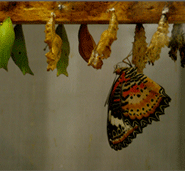This year, The Fuschia Tree's issues tackle 'The Unseen': seemingly invisible and tangential ideas that change the course of our lives. If there is an Unseen that has preoccupied you, or affected you deeply and you would like to have us create stories around it, feel free to email us at . The Choice, after all, is yours.
When we choose to spend the day walking in the mountains or to cover a page of our best notebook with doodles, or places leaves in a flower vase to give the arrangement 'texture', colour-code our bookshelves, bake our own bread, wait long years before our rhododendron grows, perhaps we are committing a folly.
Folly, though understood as foolishness, is praiseworthy: To reach outside of the format, to live with pleasure, celebrate pain, and to hold beauty above rewards might allow us to find curiosity in uncertainty, newness in old places, freedom within boundaries and meaning in the lack of it. To be a fool and know you wouldn't have it any other way.
This issue features four very intimate conversations; in the slippage between question and answer is a space that holds the erratic, irrational, joyous and useless.
Poet Vivek Narayanan, in a wonderful audio conversation, talks about the importance of voice. As we saunter through the various locations in which he grew up, and stumble through what this makes him as a result, we are forced to hear the three voices he speaks of: the spoken, the written and the imagined voice. In this surrender to sound is the work of the poet.
Artist Shilpa Gupta talks about her work as extensions of life, in which the physicality of form and phrases of text act as expressions of intangible desire. The folly of the earthly allows her to express the freedom that we are offered and refuse.
Archana Prasad, co-founder of Jaaga, a jigsaw building in Bangalore, tells us about always being inspired, about missing things, about attachments and constantly leaving them behind. She yearns to live in a world in the future, where she can live to be immortal. Didn't the gods tell her of this folly? Yet, she relishes in it.
Finally, Amitabh Kumar and Prayas Abhinav create a visual dialogue between fragmented parts of a body and the things of this world, evoking the absurdity of living, the essential causality between events and how meaning might only be derived from perspective, which we are blind to, in any case.
Despite the danger of folly, in these conversations is a playfulness, a willingness to give in to mistakes, to disorder, to feel entirely insecure, to move, search for meaning, and comfortably not find it. To look into the mirror, and believe the mirror. To invert, instead, our own eyes.
"You'll find nothing frolic or fortunate that it owes not to me," Folly, in Erasmus' In Praise of Folly.
In the end, the series on The Unseen allows us to view the life of the art practitioner not simply as an avenue into their art, but perhaps as a lens into our lives. If to make art is to explore the potential beyond the known, then so is this exercise in getting to know the people behind it.
Foolishly,
Himali.
Editor's Note.
Every sunbeam, every strain of music, every sapling and starfish is ultimately the regeneration of a previous something, a collection of somethings, taking on new shape. At the most indivisible level we can comprehend, all life is nothing more than atoms and molecules dancing their way through various forms. And if everything comes from something, it stands to reason that everything must go to something as well.
Read More
Illusion: Seeing Beyond Seeing
Meaning: In Search of Significance.
Melody: A Different Tune
Rhythm: Ordering Time


